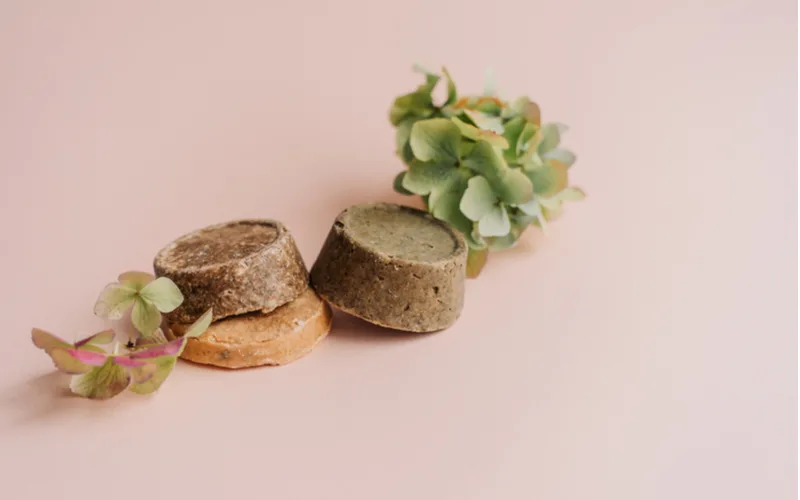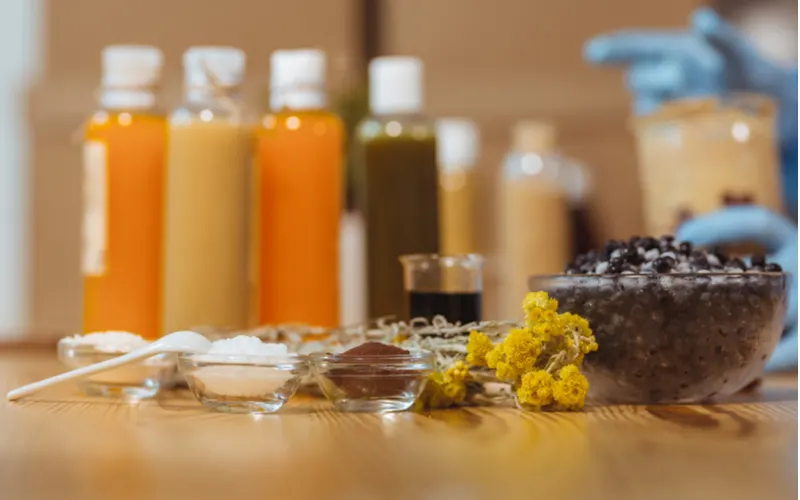Jump to:
Sometimes, the harsh chemicals in store-bought shampoos can end up doing more harm than good. Learn how to make natural shampoo for stronger, healthier hair.
Making Natural Shampoo: A Summary

Galina Tsyrulnik/Shutterstock
Harsh chemicals and synthetics commonly found in commercial hair care products can lead to a dry scalp and lifeless locks. Fortunately, it’s easy to make your own gentle, natural shampoo in just a few simple steps:
- Combine purified water and gentle castile soap in a 1:1 ratio.
- If you want a moisturizing shampoo, add natural oils.
- For a clarifying experience, add lemon juice or vinegar.
- Add egg white for extra strength and shine in your locks.
- To protect against damage, add honey.
- Add a few drops of essential oils.
Making your own natural shampoo is easier than you might think, and it’s far gentler on your hair than many drugstore brands. Read on to learn more about how to make natural shampoo that will keep your hair clean without stripping it of any natural oils.
How to Make Natural Shampoo in 6 Easy Steps
If you find yourself having hair issues such as dryness, breakage, or frizz, your hair care routine could be to blame. Many drugstore shampoos contain common compounds that can be harmful to your hair and scalp:
- Alcohol: Ingredients such as Propanol, ethanol, isopropyl, and propyl alcohol can dry the hair and the scalp.
- Sulfates: Ammonium lauryl sulfate, sodium laureth sulfate, ammonium laureth sulfate, and sodium trideceth sulfate remove natural oils from hair.
- Parabens: A wide variety of parabens found in cosmetics may be potential cancer-causing agents.
- Phthalates: Any product containing phthalates may be harmful to the environment and may even lead to hormonal imbalances.
- Formaldehyde: This is another carcinogenic ingredient readily absorbed by the skin.
- Dimbethicone: Shampoos with this ingredient can cause dryness, follicle blockage, and hair loss.
- Retinyl Palmitate: This compound may cause mild to severe irritation in sensitive individuals.
- Toluene: Shampoos containing this ingredient may hamper immune function. Pregnant women should be especially wary of toluene, as it can lead to congenital issues.
- Imidazolidinyl: This compound may irritate your skin and scalp. It can also cause problems if it gets into your eyes.
One of the best ways to avoid harsh ingredients in your hair care regimen is by making your own shampoo and conditioner. You can refrain from using unknown chemicals and stick to safe, gentle, and all-natural ingredients that will keep your hair looking healthy.
When making shampoo, you don’t need to include all of the following ingredients. Only add the ones that you need to suit your hair care routine.
1. Combine Equal Parts Water and Castile Soap
To make basic shampoo, you should combine water and Castile soap in a 1:1 ratio. Doing this will give you a good foundation to add other healthy ingredients such as oil, egg, and honey. You can also use your water and Castile soap base by itself as a bare-bones hair and body cleanser.
While traditional soaps use animal-derived fats such as glycerin, Castile soap contains only vegetable compounds. It is non-toxic, biodegradable, and gentle enough for most skin types, including children.
Castile soap gets its name from the Castile region of Spain, where it was traditionally made using olive oil. Nowadays, you can find a variety of different Castile soaps made of plant oils ranging from coconut to hemp oil.
Castile soap by itself can be somewhat harsh. Diluting it with water ensures that it won’t strip too many natural oils from your hair or leave your scalp feeling dry. It’s always a good idea to use purified water when making shampoo.
That way, you avoid adding any harsh minerals to the mix. Tap water often contains chemicals such as chlorine that can dry out or damage your skin and hair. Running it through a purification system such as a reverse osmosis filter will help to remove potentially harmful components.
2. Add Oil for Moisturizing Benefits
One of the most common ingredients that people add to their Castile soap and water mixture is some type of natural oil. Adding oil helps both to improve the consistency of homemade shampoo and offers moisturizing benefits for the hair and scalp.
Natural oils help to rehydrate dry hair by penetrating deep into strands and even repairing the outer cuticle. Oil can also coat strands of hair, helping them to retain moisture and protecting against dryness throughout the day.
The amount of oil you add will depend on the level of moisturization your hair needs. For mild, daily conditioning, you will only need around a teaspoon of oil per cup of Castile soap. For deep, therapeutic conditioning, add two teaspoons per cup.
Not all oils are created equal when it comes to hair care. Different natural oils offer different hair care benefits and possible side effects. Some of the best oils to use in natural shampoo include:
- Coconut Oil: Ideal for deep moisture treatments.
- Castor Oil: Good for dry or damaged hair.
- Jojoba Oil: Helps with dry scalp and dander.
- Almond Oil: Nourishing compounds encourage thick, healthy growth.
- Olive Oil: Provides extra gloss and shine.
- Avocado Oil: Helps to reduce frizz.
- Grapeseed Oil: Strengthens brittle hair.
- Argan Oil: Protects and moisturizes hair strands.
- Sunflower Oil: Works to strengthen hair and prevent breakage.
While a little bit of oil can be beneficial to hair, too much may disrupt your scalp’s natural balance. It may take some trial and error to find the amount of oil that’s just right for you. It should be enough to keep your hair hydrated without leading to grease and oil buildup.
3. Add Vinegar or Lemon Juice for Clarifying Benefits
Adding some acidity to your shampoo can help to clarify your hair and strip away excess or unwanted oil that leaves it feeling greasy. You should add around one to two tablespoons of acid per cup of Castile soap.
Apple cider vinegar offers a natural and healthy way to add acidity to your shampoo. It also contains nutrients and antioxidants that boost hair and scalp health. You can also use lemon juice or lime juice to add some citric acid as well as a pleasant, zesty scent.
Both vinegar and lemon juice can help to reduce redness, inflammation, and itchiness surrounding a dry scalp. Vinegar and lemon can also work to combat scalp infections, thanks to their antibiotic properties.
If your scalp has a high pH, adding acid to your shampoo can help restore your natural balance. A basic scalp will strip away essential oils, leaving you feeling dry and itchy. You can protect the natural oils that keep your hair moisturized by lowering your scalp pH.
Read Next: What Is Clarifying Shampoo?
4. Add Egg Whites for Strength and Shine
Eggs are bursting with healthy amino acids that can improve hair and skin health. While adding egg white to your shampoo may seem unorthodox, it’s one of the best all-natural ways to give your hair an at-home protein treatment.
Egg whites can help hydrate and protect your hair while adding strength and shine. They may even help promote healthy growth and repair past damage for thicker, silkier locks. Add around one beaten egg white per teaspoon of Castile soap.
5. Add Honey for Protection
For millennia, humans have prized honey not only for its taste but for its medicinal properties. Civilizations ranging from the Ancient Egyptians to the Romans have used honey for health and beauty applications.
Honey is an emollient, meaning it helps to soothe and soften the skin. It can improve scalp health and reduce the incidence of dandruff.
What’s more, honey’s natural antibiotic properties work to protect skin against infection. Honey also helps to produce thick, silky, and moisturized locks. It can penetrate into the hair shaft and deliver both moisture and nutrients.
Honey also protects your hair throughout the course of the day from wind, weather, and even heat damage. You can add around two to four tablespoons of honey per half cup of Castile soap.
Read Next: How to Get Rid of Dandruff
6. Add Essential Oils for Scent
If you want your natural shampoo to have some scent, you should skip the synthetic fragrances. These can be harsh on the skin and may even contain toxic or carcinogenic compounds. Instead, it’s best to stick with high-quality, all-natural essential oils for scent.
You can find a wide variety of essential oils and oil blends derived from plants and other natural sources. Many of these can be harsh on the skin and may irritate your scalp in large quantities.
You should always dilute essential oils in a carrier oil such as coconut or jojoba oil before adding them to cosmetics. It only takes a few drops to add a lasting scent to your homemade shampoo blend. Some of the best essential oils for hair include:
- Peppermint oil
- Tea tree oil
- Lavender oil
- Lemongrass oil
- Rosemary oil
- Cedarwood oil
- Thyme and clary sage oil
Frequently Asked Questions

Studio2sim/Shutterstock
Here, we’re going to go over the answers to the most common questions people have when making natural shampoo:
What is natural shampoo?
Natural shampoo is a dedicated hair cleanser that uses nature-derived ingredients instead of chemicals. Natural shampoo is often gentler on the scalp and healthier on the hair than those containing synthetic ingredients.
Is homemade shampoo good for hair?
When making a homemade shampoo, you can avoid any of the harsh chemicals found in store-bought shampoos. In most cases, a natural, homemade shampoo will be healthier than any synthetic alternatives. However, you still need a balanced formula for the best results.
What is the main ingredient in homemade shampoo?
The two main components in most homemade shampoos are purified water and castile soap. This type of soap contains vegetable fats instead of animal fats, resulting in a gentle yet effective cleanser. You can also add other ingredients such as oils, extracts, or even egg whites for additional health and beauty benefits.
How do you make moisturizing shampoo?
Adding healthy, natural oils to your shampoo can help to moisturize your hair and scalp. Some of the best oils for hair include castor oil, jojoba oil, coconut oil, and olive oil. Certain natural ingredients such as aloe gel can also help to hydrate hair.
What ingredients are bad for hair?
A wide variety of chemical ingredients found in most commercial shampoos are harmful to your hair. Sulfates, phthalates, and alcohols are some of the worst offenders, though other common chemicals can also cause problems. Ingredients such as parabens and formaldehyde may even be carcinogenic.
So, How Do You Make Natural Shampoo?
Switching to an all-natural shampoo can help to give you stronger, shinier, and all-around healthier locks. You can save money and avoid unwanted ingredients by learning how to make natural shampoo yourself at home.
With just a few simple ingredients, you can create a unique shampoo designed to cater to your specific hair care needs. Be sure to let us know how your shampoo making experience went!
